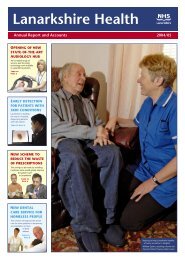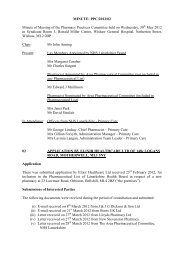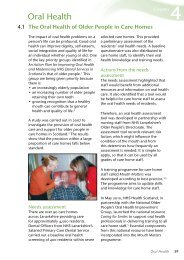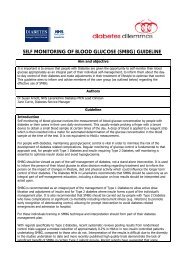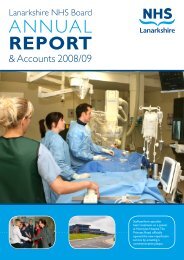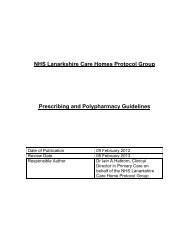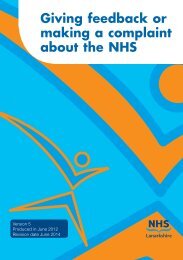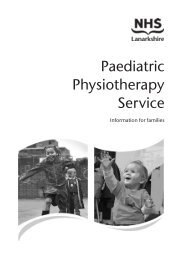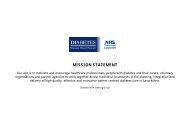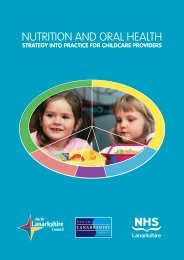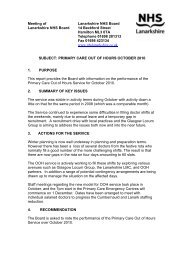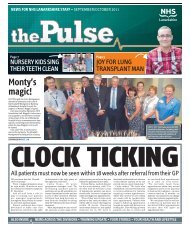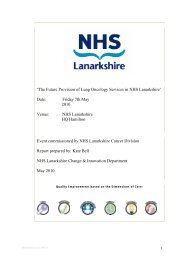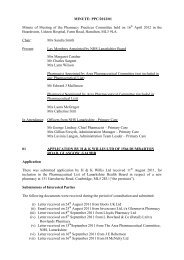Palliative Care Guidelines - NHS Lanarkshire
Palliative Care Guidelines - NHS Lanarkshire
Palliative Care Guidelines - NHS Lanarkshire
- No tags were found...
Create successful ePaper yourself
Turn your PDF publications into a flip-book with our unique Google optimized e-Paper software.
<strong>Palliative</strong> <strong>Care</strong> <strong>Guidelines</strong>: FatigueFatigue in <strong>Palliative</strong> <strong>Care</strong>IntroductionA persistent, subjective feeling of tiredness, weakness or lack of energy (physical or mental)related to cancer or advanced chronic illness.• Common (70-100% of patients receiving cancer treatment).• Not related to level of activity. Not alleviated by rest or sleep.• Affects physical function, cognitive ability, emotional and spiritual well-being.• Multiple contributory causes but exact aetiology poorly understood.• Fatigue is common in the last days of life and part of a normal dying process.Assessment<strong>Palliative</strong> care patients should be screened for fatigue and its impact.• Symptom pattern, duration; associated or alleviating factors.• Interference with function and quality of life.• Severity: mild, moderate or severe, or rated on a 0-10 scale.Disease status and treatment:• Exclude cancer recurrence or progression.• Hormone treatment often causes fatigue.• Review medication - beta-blockers, sedative drugs, corticosteroids, opioids.Contributing factors and associated symptoms: (see: relevant guidelines)• pain• anxiety, depression• sleep disturbance• anaemia• poor nutrition or absorption• fluid /electrolyte imbalance: check sodium, potassium, calcium, magnesium• de-conditioning due to reduced activity level/ fitness or muscle wasting• co-morbiditieso chronic infectiono cardiac or respiratory diseaseo renal or hepatic impairmento hypothyroidism, adrenal insufficiency, hypogonadismManagementCombination of approaches tailored to the individual patient is likely to be required.• Acknowledge the reality of the symptoms, and their effect on the patient /family.• Explore understanding of the illness/treatment; explain possible causes of fatigue.• An activity/ fatigue diary may help identify precipitants/ timing of symptoms.Physical activity:Graded exercise, both aerobic and strength training; consider physiotherapy referral.Energy conservation: set priorities; pace; schedule activities at times of peak energy; eliminatenon-essential activities; short daytime naps if sleep at night is not affected; attend to one activityat a time; conserve energy for valued activities.Psychosocial interventions: stress management; relaxation therapy; sleep hygiene.Medication:• For cancer patients with anorexia/ cachexia related fatigue (see: Anorexia).• Insufficient evidence to support the use of psychostimulants by non-specialists.ResourcesNational Comprehensive Cancer Network Guideline: www.nccn.org/professionals/physician_gls/PDF/fatigue.pdfPatient leaflet on website: Managing fatigueFurther reading: http://www.palliativecareguidelines.scot.nhs.uk© <strong>NHS</strong> Lothian Issue date: January 2009 Review date: March 20121



